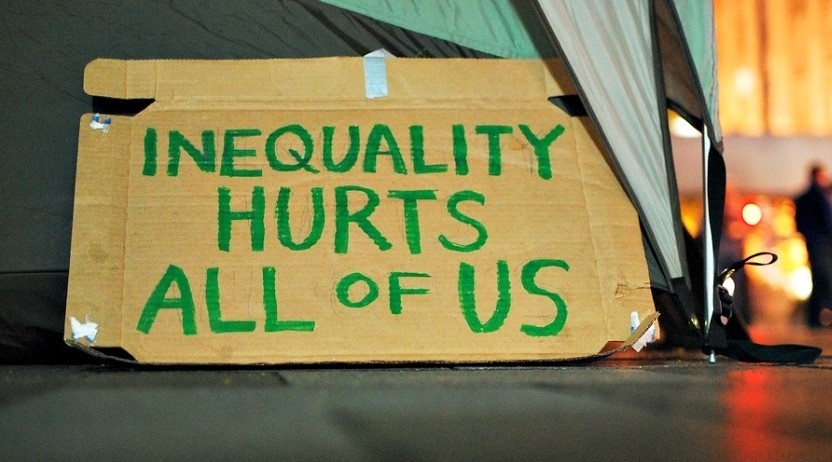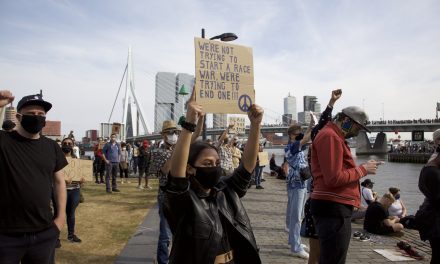Economic inequality is a stubborn problem. In a recent interview, economist Angus Deaton offers some very insightful comments about the complexity of the problem. Deaton, who is pro-globalization, but whose work with Anne Case documented the rising mortality rates among working-class middle-aged people, presents a model for the kind of engagement we really need in order to address economic problems in their complexity.
As the blog of the Stigler Center at the University of Chicago writes:
…[Deaton] suggested in a recent piece for Project Syndicate, it’s possible that the term “inequality” itself might be ill-fitting. A better term might be “unfairness”: Inequality, he argued, is the consequence of economic, political, and social processes—some good, some bad, and some very bad. The key to addressing its rapid increase is to address the processes that can be deemed “unfair.”
Examples are plenty. In his piece, Deaton focuses on several processes and policies that have allowed the rich to get richer while holding down middle- and working-class wages. Among them: rising health care costs, market consolidation, diminishing labor power, and corporations’ political power. These processes do not stem from “unstoppable processes” like technology or globalization, argues Deaton, but are the result of rent-seeking.
Deaton suggests making careful distinctions, and so avoiding sloppy explanations. He explains:
I just think that thinking of inequality as some outside cause of economic outcomes is not very sensible. The economy is a set of processes and policies, and the interaction between these processes and policies produces various outcomes. Inequality is one outcome among many.
The question he instead thinks is crucial is where “upwardly-distributing rent-seeking” is going on – this is unfair, and he indicates that it is a kind of unfairness that ought to unite Right-leaning libertarians and Left-leaning progressives. He asks the fundamental question about why the economy stopped working for everyone, and:
the most plausible stories are stories that involve rent-seeking. Mancur Olson said a long time ago that this is what would happen in mature capitalism, and you could make an argument that this has been happening all along but the Second World War sort of stopped it for a while. I don’t like stories that say inequality is bad, inequality is the problem. I wrote a book called The Great Escape: Health, Wealth, and the Origins of Inequality, in which one of the things I pointed out is that periods of great progress are usually periods of rising inequality because none of these things are evenly doled out. Rising inequality can be a sign of real progress, but I don’t think that’s what’s happening now.
Deaton’s particular targets the health care sector, which comsumes 18% of the American economy – and a not-insignificant portion of potential wage gains that workers might get:
Its effects work partly through prices, but a lot of it also works through wages, because so much of health care is provided by employers and because people don’t see it—they think they’re getting free health care from their employers. It’s an exquisitely designed rent-seeking mechanism, where you can seek large rents without most people understanding what you’ve done. It also seems extremely well-engineered to lower take-home wages and make a bunch of people in the health care sector a lot better off.
Deaton’s interview exemplifies the way in which complex social problems are dealt with poorly by monocausal explanations – whether of the Left or of the Right. In the current volume of the Journal of Moral Theology, I have an essay where I break down the morality of economic inequality into three components – exclusion, fragmentation, and theft – in order to understand more precisely the different ways in which societies create and sustain genuinely unjust inequalities. In some cases, mostly outside the US, the moral issues have to do with large amounts of people who, for example, can’t gain title to land. That is exclusion. In some cases, rising inequality depends on a class splintering between the upper-middle and lower-middle classes, rather than between the 1% and the very poor. I use Tony Annett’s excellent recent Commonweal article as key to illustrating these dynamics, as well as Richard Reeves’s text on upper-middle-class opportunity hoarding. I suggest we understand those dynamics in terms of fragmentation (whose antidote is solidarity). Finally, and perhaps most unambiguously, the Catholic moral tradition has a lengthy account of the injustice of theft – and treatments like Deaton’s suggest that some economic processes really should be understood as theft.
In the essay, I go on to apply Daniel Finn’s notion that markets necessarily have “moral ecologies,” and that arguing about justice and injustice shouldn’t be a matter of being “pro” and “anti” market, but of properly understanding the various components of the moral ecology of a given market. By “moral ecology,” Finn does not at all simply mean some amorphous appeal to “culture” or “values.” Rather, the idea is that markets themselves are human structures, necessarily shaped by a variety of parameters – including but not limited to “culture” – all of which should be considered when making more precise moral judgments about economic injustice. And this is especially true about inequality, which is a phenomenon that happens differently in different economies, and is ill-served by sloganeering vilification of a certain group – a strategy unfortunately prominent across the political spectrum.
Instead, we need a better discussion of particular problems. In a certain sense, inequality is like a slow, chronic economic disease – it kills a society not all at once by some massive events, but rather like a gradual, even multi-generational set of processes that slowly but surely destroys the real goods involved in the human project to get beyond subsistence. Appreciating the multicausal complexities, along Deaton’s lines, helps us name our personal sins, but more importantly helps us identify particular social structures where broader agreement might be forged around change for the better.



